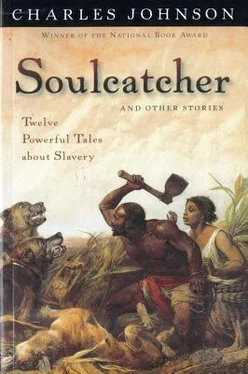Yet all that, Mr. President, is nothing compared to the fear .
To a man, the natives of St. Domingue believe in voodoo. During the nights of sweltering heat, when one's bedsheets are soaked through before dawn, we can hear from our lodgings in the capital the endless pounding of drums — the same tom-toms that one heard on August 22, 1791, when the voodoo priest Boukman, his leaders (among them Toussaint), and the blacks they incited swept from one village to another, torching buildings and killing every white man, woman, and child they saw. (Yes, it is true that the insurrectionists hoisted on high dead white babies impaled on their swords, but as to the report of cannibalism, which you inquired about, I have yet to receive confirmation.) The smell of that white massacre lingers on the air. I have been informed that for weeks the sky glowed with sheets of fire, and that more than 6,000 coffee plantations and 200 sugar refineries were destroyed. It is a chilling sound, these drums. Three are employed: the natives call them the Mama Drum, Papa Drum, and Baby Drum, and as they are played, the blacks perform a wild dance called the Meringue. I have personally witnessed them crooning a half-spoken, half-sung chant at their voodoo rites, where witch doctors transmogrify the dead — and sometimes living men — into zombies (The Enlightenment, I assure you, has yet to reach the outlying villages here), which are mindless slaves who do the bidding of their masters. (I've been told the witch doctors who conspired with Boukman and Toussaint took a special pleasure in turning their former owners into such spectral creatures.) For a white man, there is the fear here of being murdered in one's sleep. Since hearing of these unholy practices, my poor Cornelius has not slept well in days, and he screams at every sound in the night I must assure him each evening that I keep a firearm by my bed in the room next to his own where my wife, Emma, and I sleep, and that we have trustworthy sentries — the more-Europeanized mulattoes — stationed with rifles just outside our doors.
Lately, I have been rereading your splendid Notes on the State of Virginia, partly because some nights sleep and I are strangers, and partly because my position as consul in the first all-black nation in the Western Hemisphere has whetted my curiosity to better understand what transpires beneath the ulotrichous skull of the Negro. You are right, I believe, when in your Notes you observe the inferiority of pure-bred blacks at Monticello, their childlike nature, their physical proximity to the apes, and their inability to grasp the arts and sciences as, for example, you have so wondrously done in your writings and studies on architecture, geology, natural history, and scientific forming. Clearly, as you state, the white race is blessed with greater beauty and in America is destined — as if by divine decree — to be the black man's master, to guide him as the parent does the child, and surely this is for the Negro's own good, lest he, in our state of freedom, fall deeper into savagery. No, none of these matters do I question as I revisit your Notes . But I have begun to wonder since our arrival at Le Cap, and after such A Report from St. Domingue 63 close contact with Negroes like Jacques Dessalines (during their Revolution he cried to the other slaves, "Those who wish to die free, rally round me now," which is hardly different than our own Patrick Henry's "Give me Liberty or give me death"), if perhaps the lower standards and performance you so precisely observed in the Virginia slaves are not innate, after all, but rather the product of the severity of American slavery itself.
I venture this hypothesis, sir, only because in the blacks of St. Domingue, living now free of whites — Spaniards and Frenchmen — for the first time since 1512,1 have seen a pride, independence, and ambition (as well as arrogance) that favors the confidence of our own patriots after they defeated King George. Nowhere is this pride more evident, or infectious, than in Le Cap, and in the person of the island's beloved leader, Toussaint L'Ouverture. As General Washington is to us, he is to them: a warrior legendary for his courage; the framer of their Constitution; and a statesman capable of forgiving his defeated enemies, for Toussaint has approved trade with France, and it is well known that he has sent both his sons to study at world-acclaimed institutions in Paris.
You will be interested to learn that after his cold rejection of my Commission, and of me as your consul, the governor-general relented and has now allowed me to visit with him on five occasions, the most recent being yesternight. Due to illness, my wife and son could not accompany me to dinner with Toussaint and other officials of this new republic. I must say I felt a bit light-headed during the aperitif, and a little off-balance in that dining room of stunningly beautiful mulatto ladies and darker-skinned heads of state, but I smiled until the muscles round my mouth began to ache, and drank as lustily as my hosts, who seemed — I was sure of this — amused by my discomfiture. Perhaps it was the wine, or my generally fatigued condition in this horseshoe-shaped country's merciless heat, but when I looked at the head of the table, where Toussaint sat, he presented a magnific figure of manhood, one far better-looking and more dashing in his French uniform and black knee-boots than that runt Bonaparte. Gradually, I began to see why his people called him L' Ouverture ("the Opener"), and then later added "Deliverer" to his many honorific titles. He chatted now with Jacques Dessalines, who sat at his right side, and with Henri Christophe, at his left, ignoring me deliberately for as much as fifteen minutes at a time, so that all I could do was stare down at my dinner plate, shoveling down the entrée, then dessert, in humiliating silence until he deigned to politely ask me a question about you, our system of government, or our relations with the French. I believe he deliberately seated me on a chair shorter than the others at the table, so that even the women looked down at me all during the meal. Try as I might, I could not intimidate him or the others with my superior breeding, credentials as a representative of the United States government, or the color of my skin, which before their Revolution would have been enough to make most slaves treat me with deference. No, none of that worked on them. All during that evening, after we'd eaten, I fèlt a sharp pain slice through my abdomen, but you will be relieved to know, sir, that despite my weakening condition I was alert and overheard Christophe discussing with Toussaint his idea for constructing a mountaintop fortress to protect this fledging nation from attack. He wants to call it the Citadelle. His plan is to equip it with 365 heavy bronze cannons.
I must confess, sadly, that as your consul it seems to me that Toussaint knows that, despite the decision of Congress to continue trade with St. Domingue, you — as our president — have no plans to support his Revolution, indeed, that you consider its leaders to be property that has illegally seized a freedom it does not deserve, and that their successful example of insurrection sends a dangerous message to Negroes on our shores. It is this suspicion of you that led to the poor treatment I received last night, and to Toussaint's remark to Christophe that his color alone was the reason you failed to send him a greeting.
These, as I say, are the tribulations I have endured in your service since my arrival, troubles I gladly endure for my country. I list them here only for one reason. As I was leaving the governor-general's mansion, almost doubled over by the recurrent complaint in my lower regions, but smiling nevertheless, shaking the hand of my host, then Christophe's, I came to Jacques Dessalines, and swung out my palm. He took it in a firm grasp, but then I saw it. Just for a moment. There, in his left hand, which he kept behind his back, Dessalines held a clay homunculus — a white doll — of me, one with a pin stuck in its belly.
Читать дальше












